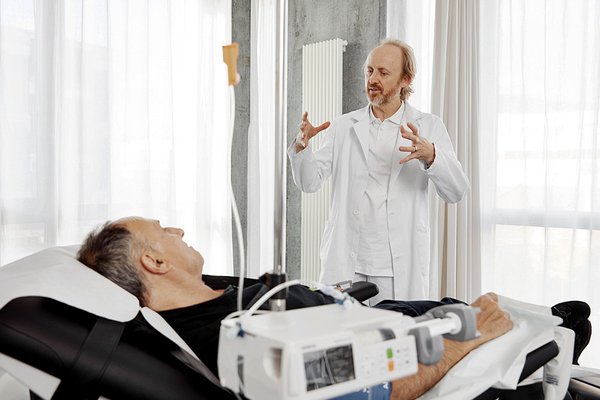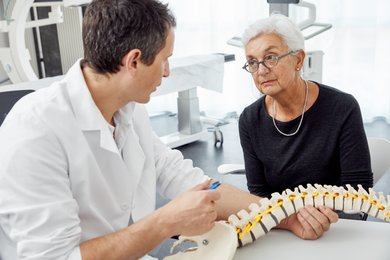Treatments
Medication against nerve pain

Nerve pain
Nerve pain occurs when nerve cells in the body or brain are damaged and thus do not work properly. Pathological signals are then sent to the brain. Affected people experience shooting, stabbing, electrifying or burning pain. Nerve pain, along with back pain and headaches, is one of the most common causes of chronic pain disorders.
Nerve pain is also called neuropathic pain and feels different from, for example, the pain of a strain or sprain. It can be caused by accidents (e.g. a cut), long-standing diabetes mellitus, shingles or trigeminal neuralgia. A frequent cause can also be a nerve entrapment, e.g. in the neck area or at the back of the head. Neuropathic pain also often occurs after amputations of an arm/leg. Patients with certain cancers or multiple sclerosis can also develop neuropathic pain symptoms.
There are several therapeutic options for treating neuropathic pain. Medication is frequently just one of these options.
At the beginning of a treatment
Once there are likely indications that the pain is due to nerves, targeted medication for nerve pain is then considered. At the beginning of a nerve pain treatment, the anticipated benefits of the therapy and the possible side effects are discussed.
When choosing a specific medication, the pain problem itself as well as the patient's further medical situation play an important role.
‘Off-Label’ - Treatments
In Switzerland, the Swiss Medicines Agency 'Swissmedic' is responsible to regulate and authorize the use of medication. Swissmedic authorizes certain medications explicitly for certain disease states (indications). Frequently, it becomes apparent later on in daily use that an active substance is also helpful for other disease states. If a drug is used under these conditions, it is called an 'off-label' treatment.
In pain medicine and particularly for the treatment of neuropathic pain, 'off-label' therapies are used frequently all over the world. This is often due to the lack of alternatives, as there are no specifically approved drugs for many pain disorders.
The following anti-neuropathic drugs are frequently used in pain medicine (list is not exhaustive):
- TZA
- SSNRI
- Antiepileptic drugs
- ...
Determining the correct dose
Medication therapy for nerve pain is usually started with a low dose that is gradually increased over time. The aim is to determine the optimal dose with the maximum possible effect on the nerve pain problem.
In some patients, a planned increase in dosage is not possible due to side effects. The treatment strategy is then reconsidered and, if necessary, a change to another medication must be evaluated.
When can pain reduction be expected?
Anti-neuropathic treatment with medication usually takes some time before the desired effect sets in. Sometimes it takes weeks for the pain-reducing effect to appear.
In this context, it is also important to remember that every person is different and thus reactions to a particular medication vary. For some patients, the anti-neuropathic medication already has an effect from the first day, whereas for others, more patience is necessary.
In case of doubt: The intravenous local anesthetic test as a guide
If there is uncertainty about whether anti-neuropathic medication should be tried or continued, an outpatient intravenous (i.v.) local anaesthetic test can be helpful. Through the i.v. administration of the local anaesthetic lidocaine, it is possible to determine whether a pain condition can be effectively treated with certain anti-neuropathic drugs or not.
What if the drugs do not work?
If the nerve pain remains unchanged despite medication therapy or if side effects make therapy impossible, the treatment strategy must be reconsidered and, if necessary, a change to another medication must be discussed.
Driving / operating machinery
During the first 1 - 3 weeks of therapy (adjustment phase), while increasing the dosage or changing to another anti-neuropathic medication, driving or operating machinery should be avoided. During this time, side effects that limit the ability to react are common.
Alcohol should be consumed with caution during therapy with anti-neuropathic medication. Alcohol further impairs the ability to react, thus driving should be avoided after consuming alcohol.

















